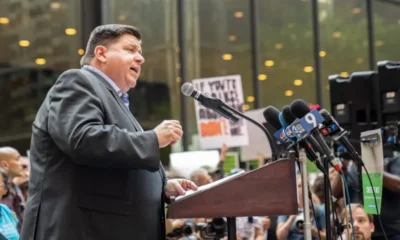Connect with us
Published
2 years agoon

Earlier in 2021, California awarded $30 million in grant funding through the Cannabis Equity Grants Program for Local Jurisdiction, focusing on supporting and including individuals in California’s legal cannabis marketplace who are from communities negatively or disproportionately impacted by the War on Drugs.
Though, some cannabis professionals in the state are questioning whether this is enough to truly provide equity to those in need.
Alphonso “Tucky” Blunt is the owner of a cannabis store, Blunts and Moore, in Oakland, and opened the shop a little more than three years ago. He said it is nearly impossible for Black and other minority-owned cannabis startups like his business to make profit in California.
“Where’s the tradeoff? I’ve been in the business for a few years and I’m still in the red. California has one of the highest tax rates on cannabis businesses anywhere. Oakland is in the top four of anywhere in the country,” Blunt said, reported by California Black Media and EurWeb. “We also pay the most for armed guards. It costs like $25 to $30 per hour. The city requires us to have them—unlike Berkeley where they are not required. But police respond faster there.”
He added that cannabis business owners must pay federal taxes but can’t write off any expenses, because cannabis is not legal on the federal level. Businesses also have challenges banking because of federal restrictions, and criminals frequently target cannabis businesses as well. When that happens, insurance companies are often unwilling to pay for damage of lost products, Blunt said.
Forbes recently covered an adjacent issue in the same area, with at least 25 legal cannabis businesses in Oakland being burglarized over two weeks in November, with damages in excess of $5 million.
“Cannabis businesses are being attacked,” as Amber Senter, a leading Oakland cannabis entrepreneur and social-equity advocate, said in an interview.
Senter led calls for tax relief and increased police presence for legal cannabis businesses, who pay the highest city and state sales and excise taxes. A local tax levied on Oakland’s cannabis businesses contributes to an extra $14 million annually in city coffers, according to the budget figures.
To address some of these challenges, legislators in the state have taken a number of steps in order to lower barriers in entering the industry, aiming to keep businesses afloat and combat some of the challenges.
“There is no doubt that the War on Drugs has disproportionately harmed people of color and their communities,” said Senator Steve Bradford (D-Gardena), who is also chair of the California Legislative Black Caucus.
Following the approval of the $30 million fund, the Department of Cannabis Control (DCC) recently released regulations it will follow to implement Senate Bill 166, establishing a fee waiver program. Business owners living at or below 60 percent of the Area Median Income, who were previously convicted or arrested of cannabis-related offenses or who live in a community negatively impacted by past cannabis policies would be eligible for the program.
The waivers go toward licensing fees for potential businesses, and they can range from $1,205 to $77,905. The DCC will start accepting fee waiver requests on the first of the year.
“There is no doubt that the War on Drugs has disproportionately harmed people of color and their communities,” Bradford said. “SB-166 is part of my continued mission for the Government to atone for the wrongs inflicted on people by supporting them with opportunities to enter and thrive in the cannabis market.”
Blunt said that, while he welcomes the $30 million investment, cannabis professionals like him need more.
“We need a two-year tax break. We have to pay some sales taxes but the extra cannabis taxes we pay, we need to break to recover. We can save some of that money and reinvest in our businesses and have some money for security,” Blunt said. “My business makes around $5 million a year, but the money I spend on security and taxes alone is easily in the $2 to $3 million range—and I’m not counting other expenses like payroll and other operational expenses. How will we ever make a profit?”


German Authorities to Ban Cannabis Smoking, Vaping at Festivals Including Oktoberfest


Illinois Governor Cites Cannabis Reform While Campaigning for Biden


States With Legal Weed See Increase in College Applications


‘Star Wars’ Blue Milk Released from Multiple Brands Ahead of May the 4th


Stoners Still Gathered at Hippie Hill for 4/20 Celebration Despite Event Cancellation


Ohio Company Signs Deal To Grow Hemp for Bioplastic
